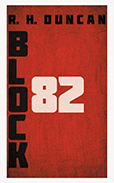
 |
Beirut in the 1980s lies dying and “torn up in civil war” in Duncan’s historical and political novel. Her protagonist, Nadia, witnesses unforeseen destruction of Lebanon from Israel’s invasion. Forced to flee Beirut, Nadia reluctantly joins her family for shelter at her Uncle Hamed’s modest farmhouse in Labweh. In the absence of her father, Nadia’s mother, Jawaher, tries to maintain some semblance of a normal family life. Meanwhile, Nadia’s brothers struggle with the unstable situation internally and externally.
Nadia yearns for the city life, but continuous obstacles prevent her return. Simultaneously, the tensions of her personal life come to the fore amid long nights of bombings and the slaughter of Lebanon’s people. Duncan’s narrative unfolds with Nadia’s engagement to Najm threatened by conflicted feelings as she hesitantly accepts a new love from friend Tony, whose eyes reveal “Beirut warmth, tenderness, and wishful dreams.” Nadia wrestles with the swirling mess of her life, making drastic decisions for safe passage to Beirut with hopes of an end to the invasion and a return to freedom.
In Duncan’s story of love, traditions, shame, and honor, she explores religious conflict and cultural persecutions set against the backdrop of Lebanon’s turmoil. Her characters’ damaged lives mirror that of the large-scale destruction taking place as each seeks a way out of the fog of war. Shifting between Nadia’s and Tony’s perspectives, Duncan puts a lens on the invasion through her two principal characters. Their undeniable love is divided by differences and conventions while they follow desires and dreams for safer, better futures. Subplots involving minor characters are introduced but don’t enhance the plot as much as expected. Ultimately, the novel belongs to Nadia and Tony, where Duncan documents and celebrates an unhappy-turned-happy couple in a realistic, historical tale of war, pain, and love.